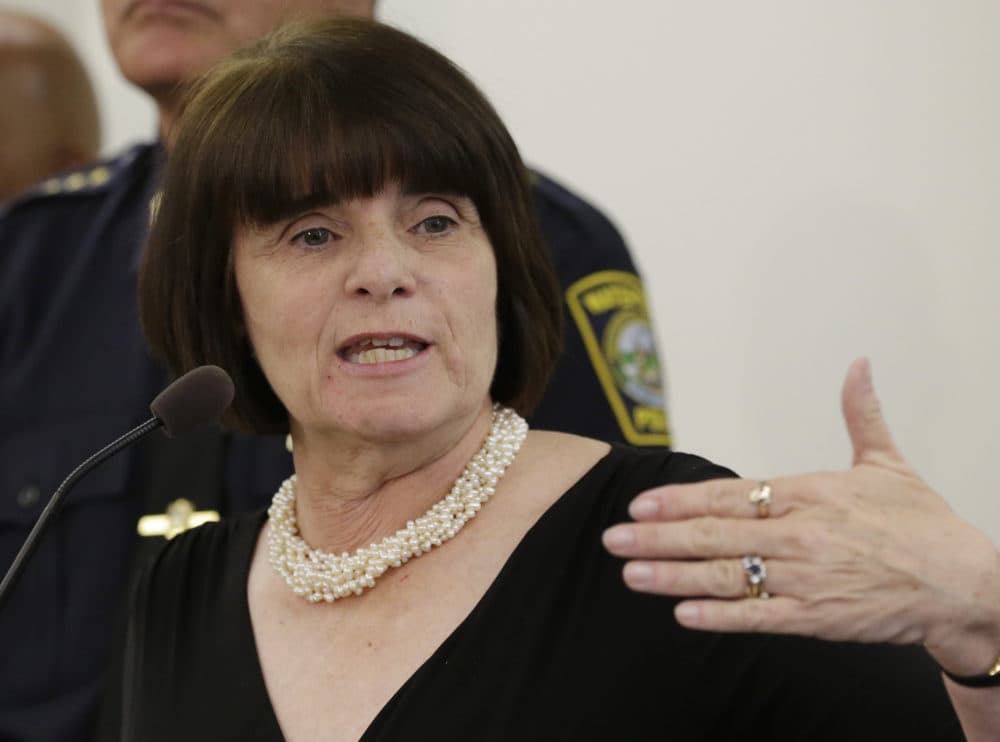Advertisement
DA Ryan Asks State's Highest Court To Review Cases Tied To Hinton Drug Lab

Another Massachusetts prosecutor is taking steps to deal with fallout from the nearly decade-long drug lab scandals that have rocked the state's criminal legal system.
Middlesex County District Attorney Marian Ryan filed a petition with the state's Supreme Judicial Court on Friday asking it to review all criminal drug convictions based on evidence tested at the now-closed Hinton Drug Laboratory during the years in which two disgraced state chemists worked there.
"The Supreme Judicial Court has broad superintendency powers over all lower courts, over all cases, over everything all over the state," Ryan said. "So we've asked them to exercise that power because this is a systemic issue, and it requires a systemic response. We shouldn't be going county to county, person by person and trying to figure this out. That doesn't make sense."
Ryan's filing followed Suffolk County District Attorney Rachael Rollins' announcement this week that she will review all drug convictions in Suffolk County connected to the Hinton Lab.
Ryan's filing would affect cases across the state and seeks to have the SJC examine the 2014 state inspector general review of the Hinton Lab. The OIG review, done under former Gov. Deval Patrick's administration, found widespread problems existed at the state-run drug lab in Jamaica Plain, but concluded that convicted state chemist Annie Dookhan was "the sole bad actor" there.
Dookhan pleaded guilty in 2013 to charges of tampering with drug evidence. Tens of thousands of criminal convictions were vacated because of Dookhan's misconduct.
"The inspector general told us that based on their investigation — their $6 million investigation — that they were certain that Annie Dookhan was the only bad apple," Ryan said. "They also told us that they found a complete lack of oversight, training protocols and management failures. So the logical question is, if you have all of those things happening, how is it that only one person's work could be affected?"
The inspector general's review did not look at cases involving another state chemist charged with misconduct. In 2014, former chemist Sonja Farak was convicted on charges of tampering with samples she was supposed to be testing at the state-run drug lab in Amherst. Before Amherst, Farak worked at the Hinton Lab. Although thousands of cases were dismissed because of Farak's misconduct in Amherst, there was no review of her work at Hinton.
The inspector general's office defended its report on Hinton, saying there was no indication that other drug tests there were compromised.
“D.A. Ryan is seeking guidance from the court on her discovery obligations. We stand by our report and investigation, which found no evidence of misconduct by any chemist other than Dookhan that impacted the reliability of drug testing at the Hinton lab," Inspector General Glenn Cunha, who has served in his role since 2012, said in an emailed statement.
Ryan's filing with the SJC involves the cases of Ricky Simmons and Israel Cedeno-Martinez. Both men pleaded guilty to drug charges based on drug certificates signed by Farak during her time at the Hinton Lab. Both defendants are now challenging their convictions.
"Farak’s malfeasance at the Amherst Lab occurred shortly after she left the Hinton Lab, raising questions and 'red flags' about whether she had engaged in similar misconduct at the Hinton Lab before she left," Ryan's filing said. "The District Attorney is charged with ensuring that justice is done, convictions are obtained fairly, and the public has confidence in the integrity of those convictions. To ensure justice and promote public confidence in our justice system, this Court’s guidance is necessary."
In her earlier announcement, Rollins said she plans to convene a summit with the defense bar to talk about a process for reviewing affected cases in her district. She estimates that more than 70,000 drug certifications were done at the lab for cases in her office. Because multiple certifications can be tied to one case, the number of convictions that might be vacated because of faulty evidence is not clear.
Of the state's 11 district attorneys, Ryan and Rollins have been most actively involved in reviewing cases affected by the scandals. In her office alone, Ryan said more than 17,000 drug convictions were based on testing at the Hinton lab. It's not clear how many cases might ultimately be affected, or whether other top prosecutors in the state will face renewed questions about cases in their districts.
Cape and Islands District Attorney Michael O'Keefe, who is president of the Massachusetts District Attorneys Association, called Rollins' effort this week a "publicity stunt."
"We exhaustively examined all of these cases already," O'Keefe said. "By the thousands. And the cases that involved those two chemists — if they were the only reason somebody was convicted of a crime — then those cases were already vacated."
In the past several years, the state's highest court vacated tens of thousands of convictions because of the chemists' misconduct, but it has rejected a wholesale dismissal of all cases involving all drug testing done at the labs.
